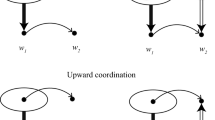Abstract
The fundamental principle of the theory of possible worlds is that a proposition p is possible if and only if there is a possible world at which p is true. In this paper we present a valid derivation of this principle from a more general theory in which possible worlds are defined rather than taken as primitive. The general theory uses a primitive modality and axiomatizes abstract objects, properties, and propositions. We then show that this general theory has very small models and hence that its ontological commitments—and, therefore, those of the fundamental principle of world theory—are minimal.
Similar content being viewed by others
References
Adams, R. (1974). Theories of actuality. Noûs 8, 211–231.
Bealer, G. (1982). Quality and concept. Oxford: Clarendon Press.
Bräuner, T. (2011). Hybrid logic. In E.N. Zalta (Ed.), The Stanford encyclopedia of philosophy (Winter 2001 ed.). http://plato.stanford.edu/archives/win2011/entries/logic-hybrid/.
Chihara, C. (1998). The worlds of possibility: Modal realism and the semantics of modal logic. Oxford: Oxford University Press.
Chisholm, R. (1981). The first person. Minneapolis: University of Minnesota Press.
Kripke, S. (1959). A completeness theorem in modal logic. Journal of Symbolic Logic, 24(1), 1–14.
Kripke, S. (1963). Semantical analysis of modal logic I: normal modal propositional calculi. Zeitschrift für Mathematische Logik und Grundlagen der Mathematik, 9, 67–96.
Lewis, D. (1986). On the plurality of worlds. New York: Oxford University Press.
McNamara, P. (1993). Does the actual world actually exist? Philosophical Studies, 69, 59–81.
Menzel, C. (1986). A complete, type-free, “second-order” logic and its philosophical foundations. Technical Report CSLI–86–40, Center for the Study of Language and Information, Stanford University, Stanford, CA.
Menzel, C. (1989). On an unsound proof of the existence of possible worlds. Notre Dame Journal of Formal Logic, 30, 598–603.
Menzel, C. (1991). The true modal logic. Journal of Philosophical Logic, 20(4), 331–374.
Menzel, C. (1993). The proper treatment of predication in fine-grained intensional logic. In J.E. Tomberlin (Ed.), Philosophical perspectives (Vol. 7, pp. 61–87). Atascadero, CA: Ridgeview Publishing Co.
Menzel, C. (2012). Sets and worlds again. Analysis, 72(2), 304–309.
Plantinga, A. (1974). The nature of necessity. Oxford: Oxford University Press.
Plantinga, A. (1985). Replies to my colleagues. In J. Tomberlin, & P. van Inwagen (Eds.), Alvin Plantinga (pp. 313–396). Dordrecht: Reidel Publishing Co.
Pollock, J. (1984). The foundations of philosophical semantics. Princeton: Princeton University Press.
Prior, A.N. (1968). Egocentric logic. Noûs, 2(3), 191–207.
Sider, T. (2002). The ersatz pluriverse. Journal of Philosophy, 99(6), 279–315.
Stalnaker, R.C. (1976). Possible worlds. Noûs, 10, 65–75.
Zalta, E.N. (1983). Abstract objects: An introduction to axiomatic metaphysics. Dordrecht: D. Reidel.
Zalta, E.N. (1991). A theory of situations. In J. Barwise, J. Gawron, G. Plotkin, S. Tutiya (Eds.), Situation theory and its applications (pp. 81–111). Stanford: CSLI Publications.
Zalta, E.N. (1993). Twenty-five basic theorems in situation and world theory. Journal of Philosophical Logic, 22, 385–428.
Author information
Authors and Affiliations
Corresponding author
Rights and permissions
About this article
Cite this article
Menzel, C., Zalta, E.N. The Fundamental Theorem of World Theory. J Philos Logic 43, 333–363 (2014). https://doi.org/10.1007/s10992-012-9265-z
Received:
Accepted:
Published:
Issue Date:
DOI: https://doi.org/10.1007/s10992-012-9265-z




